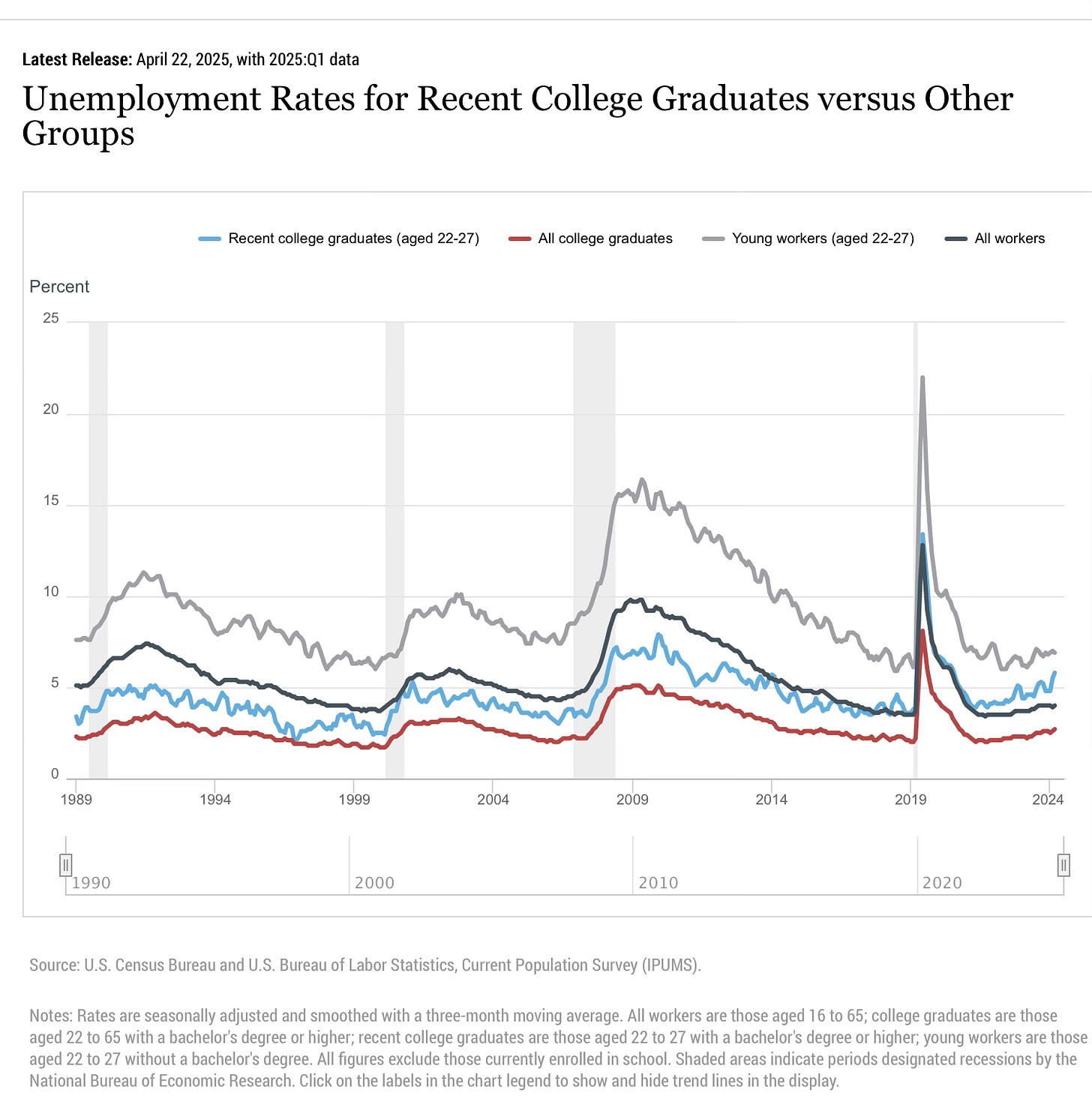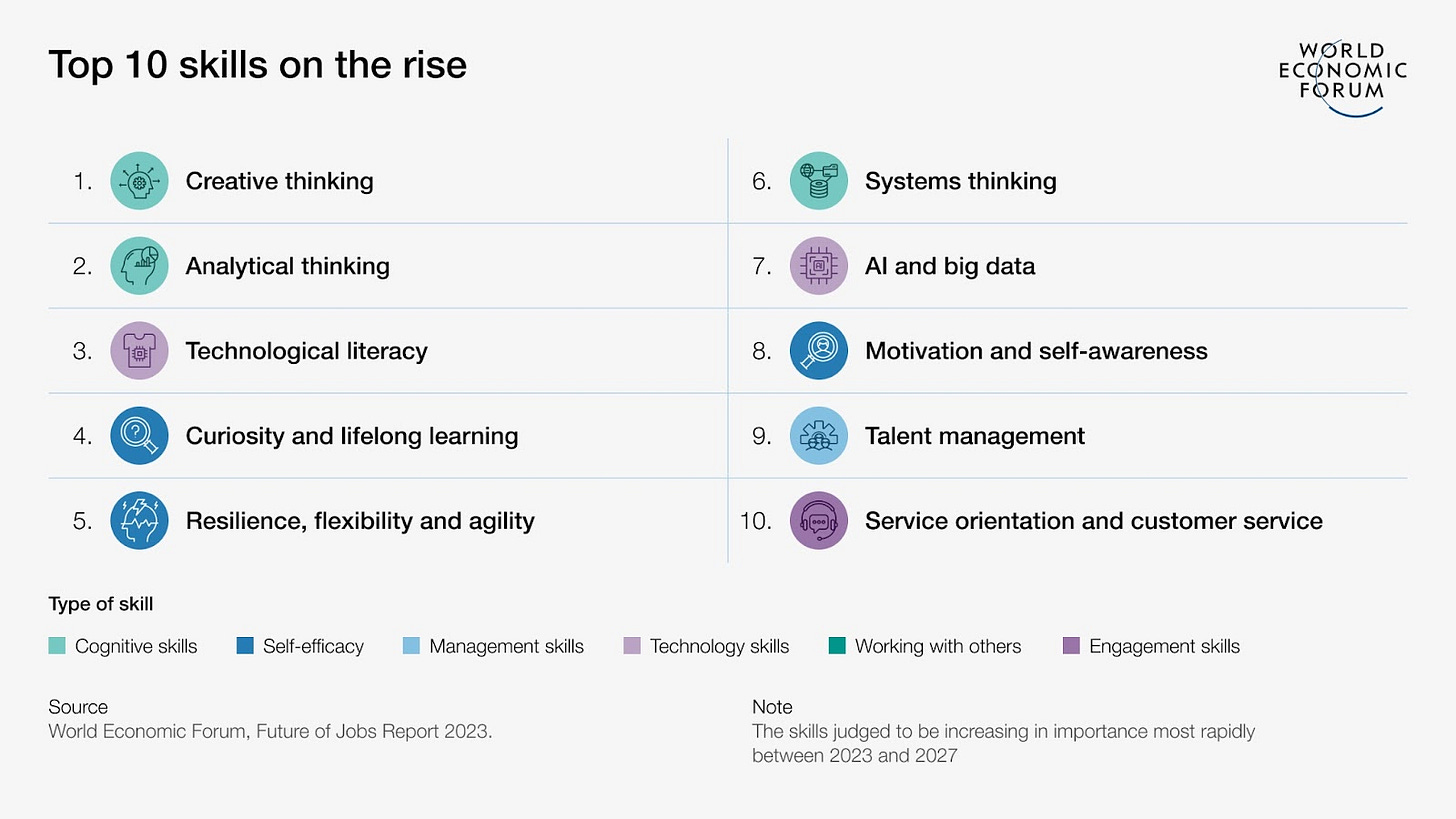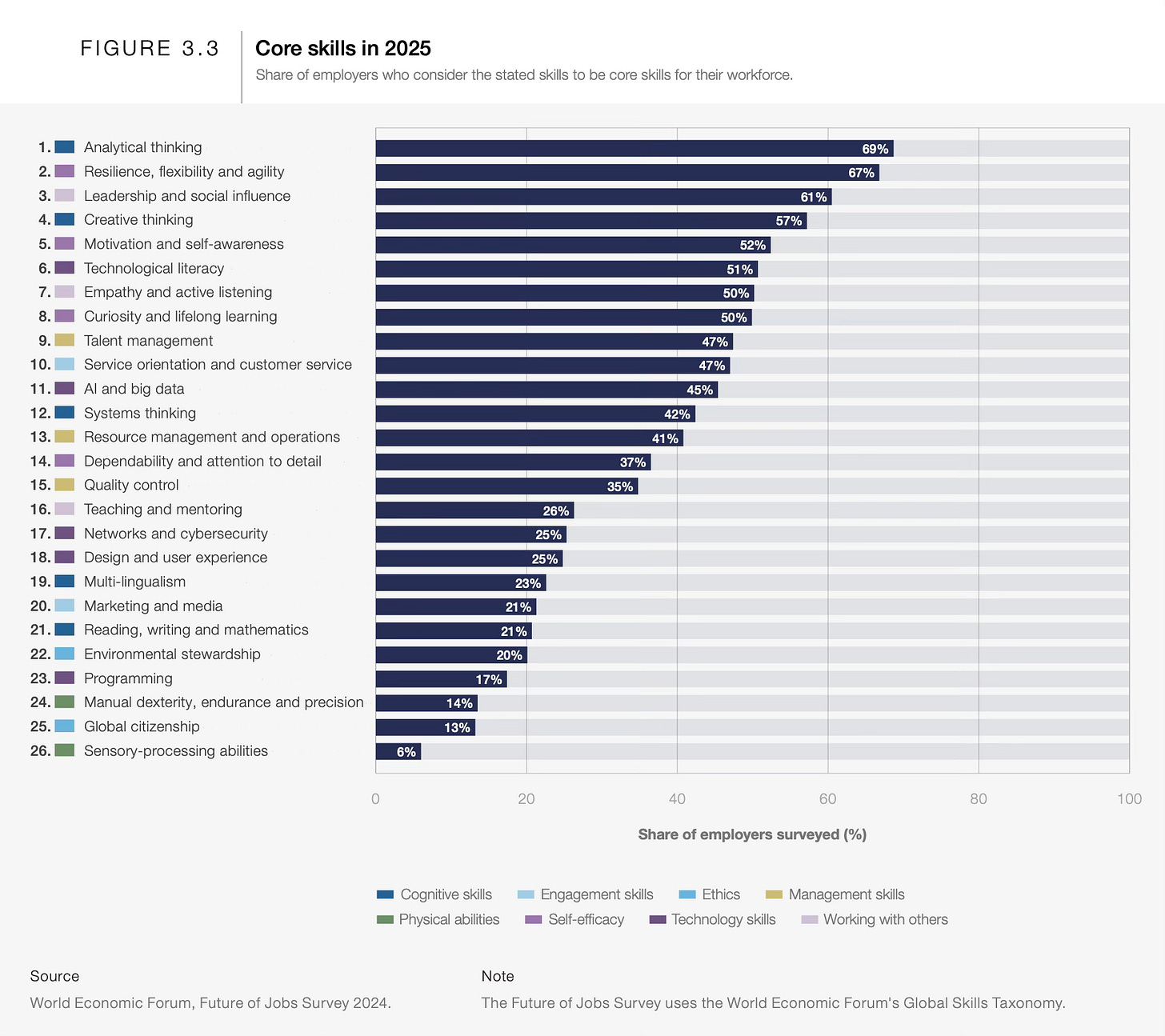35% of recent college graduates are underemployed.
I predict that this number is going to go up in light of two trends:
(1) AI continues to break the bottom rungs of existing career ladders for knowledge workers.
(2) College students increasingly outsource their most important work — and therefore their hire-ability — to chat-interface LLMs.
Paul Krugman’s economic analysis of the situation is important, but he misses a glaring fact: it’s not just that employers aren’t hiring — it’s also that recent college grads may be under-developed in their Human Intelligence (HI).
I’m talking about the “soft” but essential human skills of self-awareness and self-efficacy, the social skills of speaking, listening, empathizing, and working with others.
Many of my students — college freshmen, sophomores, and juniors — have had little experience interacting with people. They often express strain or anxiety around interviewing, dating, or holding a conversation. Working with others is either “weird,” or “terrible,” or “I-don't-know-I’ve-never-really-done-it-that-much.”
Relationship counselor Esther Perel points out that a surprising number of kids are no longer playing on the street with others, and that because of this, “we have lost an entire ground for social negotiation.” She asks, “Did you learn how to share space with others? How are you building or nurturing those skills now?”
When class starts I often need to do a little dance to get students to pull their attention away from their phones. (I don’t mind much; I like dancing). You walk in, and there’s twenty people in a room, none of them talking to each other. Eerie.
When I started teaching philosophy classes 18 years ago, you had to make noise to pull students’ attention away from each other. That difference is everything.
Lately, though, I’ve been noticing a turn towards human interaction, particularly after Covid lockdowns. Young people are hungry for real engagement. Is Tommy Dixon right? Are we entering “the end of our extremely online era?” I hope so.
In at least one of my classes each semester, students interact with each other before I arrive. Some of these classes feel like “the good ol’ days,” before the advent of social media and smart-phones with front-facing cameras.
In sum: the first round of young adults who had phone-based childhoods are now entering the workforce with limited human-to-human experience.
This translates to my rough estimate: ~35% of my students would not be good hires in the short term — or they’d need more intensive on-the-job human skills training, more patience for building a baseline for their human potential.
The Case for Developing Human Intelligence
Take a look at the “Top 10 Skills on the Rise” from the World Economic Forum 2023 Future of Jobs Report.
Seven of the top ten skills are distinctly human skills.
Cognitive skills that can be aided, but not replaced, by AI. Creative thinking, analytical thinking, and systems thinking: this is a distinctly human suite of intelligences enriched by low-stakes social negotiation.
Self-efficacy skills are even more pronounced, and even more essential. Curiosity and lifelong learning, resilience, flexibility and agility, motivation and awareness? These can be aided, but not replaced, by AI.
The 2025 report of “core skills”, which draws from 2024 data, is similar:
“Resilience, flexibility, and agility” has moved up to the number 2 spot.
“Leadership and social influence” has moved up to the number 3 spot.
“Empathy and active listening” has moved up to the number 7 spot.
It’s not just that AI agents are replacing entry level positions. It’s also that young entrants to those positions do not have sufficient practice in “working with others” to make themselves promising contributors.
This is also to say nothing of the challenges young people face with their mental health — as so much of our internal resilience is directly related to our interpersonal skills and networks.
So what do we do?
How do we train young workers to develop these essential human skills? What should young people do to promote their hire-ability and mental health?
My answer may seem obvious, because it is: get young people into more human situations.
We don’t need to be luddite about it either. Humans can interact wonderfully in well-facilitated video conferences. Virtual gatherings can also connect young people with others, and expand their network of potential mentors, advisors, and guides. I encourage my students to use AI, too, btw.
If you are an underemployed 20-something, (or the parent of an underemployed 20-something), you might find our east-west philosophical approach to human skills development appealing. I love awakening potential for lifelong learning, adaptability, resilience, and for being well with others.
I also have some reading recommendations. To start, Bill Burnett and Dave Evans Designing Your Life protocol for prototype conversations. For the social-media entrepreneurially minded, I loved Talk To Strangers, the story behind the Yes Theory YouTube channel. Shorter and to the point: Anu Atluru’s prescient series in
lays the groundwork for why “The Relationship is the Job.”For parents: How to Raise an Adult: Break Free from the Over-parenting Trap and Prepare Your Kid for Success. Jonathan Haidt’s
presents a lot of the material from The Anxious Generation: How the Great Rewiring of Childhood Is Causing an Epidemic of Mental Illness.But the simplest solution to developing human intelligence?
Just say HI. Reach out to people you haven’t spoken to in a while. Invite someone on a date. Reach out to professionals to help you unbox your assumptions. Go to office hours. Reach out to people who you resonate with.
With thanks, and a love of lifelong learning,
Sean
P.S. There are as many ways to develop human intelligence as there are ways to be human. I’d love to hear what you think.
Life is Music; Love the Only Language
Colorado friends, would love to see you. Thanks for streaming Clearer than Crystal.
Saturday, June 28th, 6-9 pm. Wellington, CO: Wellington Grill, 3724 Cleveland Ave.
Thursday, July 3rd, 6-9 pm. Fort Collins, CO: Maya Cove, 2100 W Drake Rd. With Ehren Crumpler
If you want to hang, drop-in Wisdom Workshop sessions on Mondays at 1-2pm MST or Fridays at 1:30-2:30pm MST. Small groups, typically 3-5 people. They’re fun, seriously playful. No prep needed; bring a notebook and a beverage. Also hosting open office hours, ask me anything, Mondays 2-3pm MST and Fridays 2:30-3:30pm MST. Zoom link behind the paywall.
Keep reading with a 7-day free trial
Subscribe to Wisdom Workshop to keep reading this post and get 7 days of free access to the full post archives.






